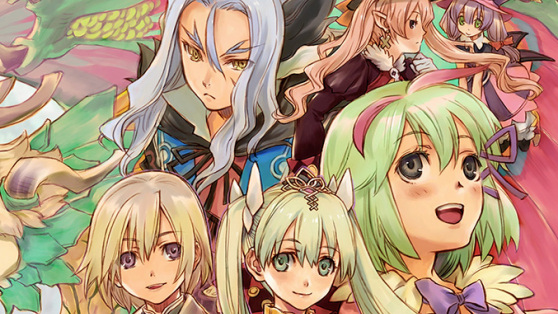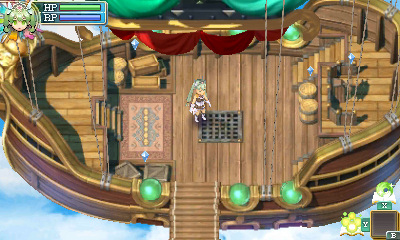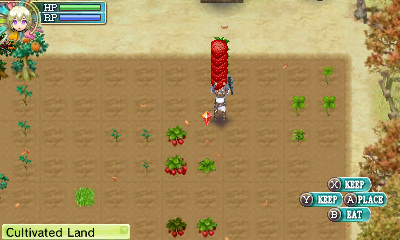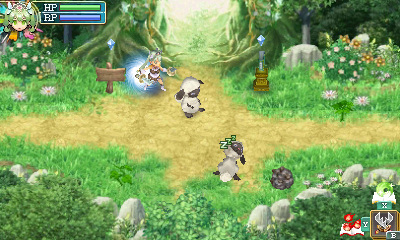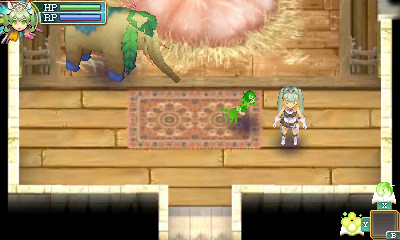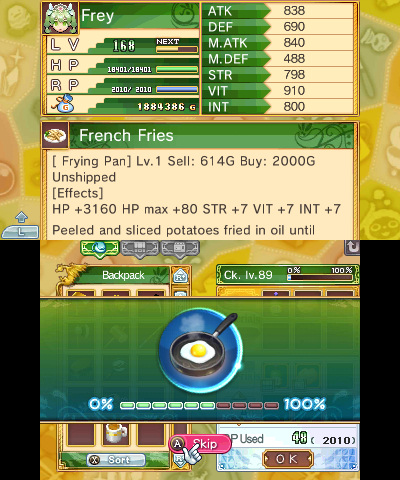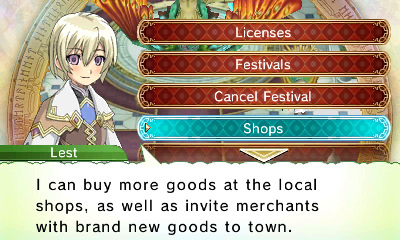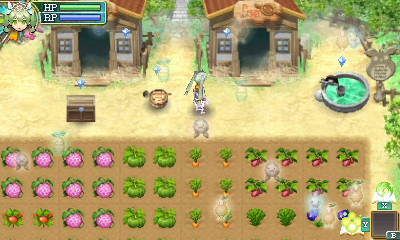You might know that Rune Factory emerged from Harvest Moon, the farming and life-simulation series that began on the Super Nintendo, but that might be the extent of your familiarity. It’s pretty niche.
Rune Factory is basically Harvest Moon plus role-playing elements, but it adds up to a lot more than that. Playing Rune Factory 4, the latest entry for 3DS, reminded me of a lot of great games. It’s one giant hodgepodge.
Below, we’ve broken down some main components and matched them with series that are much more recognizable. So chances are if you like one of these, you’ll find something to enjoy in Rune Factory 4 — plus a little extra. Xseed Games’ Brittany Avery, who works in localization, shared some secrets with us about what makes Rune Factory 4’s twist on those elements unique.
Airships: Final Fantasy
Rune Factory 4 opens on an airship, and the vibe is reminiscent of countless scenes from the Final Fantasy role-playing games. But in Rune Factory, airships aren’t just for travel — they’re also good date spots.
“For story purposes, it does show the airship being used from time to time, but for in-game travel you approach a ‘transmitter’ right before the airship, which looks similar to a ship’s helm,” Avery told GamesBeat. “It’s like a teleportation device, so it’s quick and easy!
“Even better, you can later order that a furniture shop be opened and purchase more transmitters, placing them wherever you want. Because you can use the ‘Escape’ Rune Ability to teleport to your bedroom easily, you could theoretically place a telecommunicator in your bedroom and have an instantly convenient ‘teleport wherever you want, whenever you want’ device.”
Relationships: Animal Crossing, Fire Emblem
Forming social relationships is a big part of many games, and sometimes, those friendships turn to love. Think about your chatty neighbors in Animal Crossing or the romance system in Fire Emblem: Awakening.
“What I love about Rune Factory 4 is that characters don’t just purely interact with you — they interact with each other constantly,” said Avery. “Not only is your relationship with each individual you meet going to grow by talking to them, inviting them to battle with you, learning their birthdays or their favorite things, and spoiling them with gifts — they gift back! — but you’ll see how their relationships with each other grow as well.”
Players can court characters, go on dates as boyfriend and girlfriend, and experience events that deepen the relationship. (It’s possible to date the same sex, but it involves such a convoluted set of steps that our heads hurt before we even started to type them.) Rune Factory 4 is the first in the series to explore this feature fully and more realistically. Marriage follows for those who are lucky, but it’s not the final step.
“It’s very relaxing after that,” said Avery. “You can still go on dates together and even have a child — who can also join your party, meaning along with your husband/wife, you guys can have a family outing of kicking monster butt together. Did I mention how cool it is that if you’re the female protagonist, you can fight and farm while pregnant?”
Farming: Harvest Moon
This one is pretty obvious. The main element that Rune Factory borrows from Harvest Moon is farming.
“In the story, you’re thought of as an ‘Earthmate,’ a type of person who is in-tune with and can communicate with nature,” said Avery. “It’s a common theme in Rune Factory, and that’s why you’re given farms to treat the land. The healthier your farm is, the more little elemental-balancing creatures called ‘Runeys’ spread.”
Players can farm at their own pace, starting with cheap tools and then learning to forge better ones.
“You can plant vegetables, fruits, and flowers, which can be bought or found exclusively in dungeons,” said Avery. “There’s a specific tree that actually gives a tree-related seed once a day, so I would go there every day. I eventually had one farm solely dedicated to orange trees, apple trees, grape trees, and shining trees — ore!”
Completing requests from neighbors or visiting areas in different seasons grants access to new seeds, but players can also grow some … unusual (or even gigantic) crops, like swords, shields, and dungeons.
“Literally, entire dungeons,” said Avery.
Battles and dungeons: Chrono Trigger, Ys
Because Rune Factory 4’s battles take place on the field, in a forest and grassy areas, with enemies that you can attack or ignore, it’s a lot like Chrono Trigger at first glance. But the actual battles are active, not turn-based, and involve action-heavy combat moves like in the Ys series of RPGs. Players can change the difficulty anytime for a casual romp or more hardcore experience.
“Battling in Rune Factory 4 is very fast-paced, and you’re given access to several types of weapons — short swords, long swords, spears, dual blades, gloves, axes/hammers, and staves — that have their own growth rate,” said Avery. “You can also use Rune Abilities, which function like magic spells; at first you can equip two, but you can unlock shortcuts to cast more on the fly.”
Dungeons vary by season, and players can discover more than one during spring, summer, fall, and winter.
“The story spans a full three arcs, and so there are dungeons within seasonal dungeons, hidden areas that can only be accessed on certain dates or only if you like to snoop along the walls, hidden messages or scenes if you bring along specific items or characters, [and so on],” said Avery.
“There’s a lot of exploring to do, and inviting neighbors into your party can also help in making the journey of exploration easier. If you’re in the mood to find the unexpected, try inviting certain people to your party and then go back to areas you found suspicious — you might find something new.”
Monster raising: Pokémon, Monster Rancher
In Rune Factory 4, you can tame and raise monsters to help in battle, tend the farm, produce goods like milk or wool, or serve as mounts. Yes — mounts. Sometimes, you can even create new moves together. So it’s like Pokémon or Monster Rancher, if you remember that one.
“Monsters in dungeons can all be tamed as pets if you give them food or gifts that they like, and if you have a barn to put them in,” said Avery. “Not only can you keep ordinary monsters, but now you can tame boss monsters as well, though they’re pickier than the average.
“As far as how many you can tame … I haven’t tried this myself, but knowing how many you can raise in a barn — up to 12 — and knowing how many barns you can keep on a field — two — on top of how many fields you can obtain — five … that adds up to well over a hundred.”
Cooking and synthesis: Atelier
Atelier is a niche RPG series, but it’s a good match for Rune Factory 4 because you can do tons of synthesis — not only cooking but also forging, crafting, and mixing.
“The more you use any of the utilities, the more proficient you become with them, meaning you can learn more recipes and spend less [Rune Points] making said recipes,” said Avery. “It’s a complete reward system for your efforts in gathering the ingredients, and trust me, you won’t be running out of new recipes to learn for quite a while. There are dozens of recipes per category.”
Players can purchase various equipment, like a steamer or oven for cooking — or even a refrigerator. Prepared food is helpful in battle and in wooing characters, who each have a favorite meal.
Forging enables players to create and upgrade farming tools, weapons, and battle gear while crafting produces armor and accessories.
“What gives crafting a unique flavor, however, is that all headgear crafted is visible on your character model,” said Avery. “If you want to craft some cool glasses and wear them, you’ll see them on yourself as you run around town. You can also give hats, glasses, ribbons, [and more] to your neighbors; if you give them more than one type of headgear, they’ll wear different ones throughout the week. I had the entire town of Selphia decked out in top hats once!”
(That’s a lot like fashion in the new Pokémon X and Y.)
Mixing is basically tinkering with a chemistry set for pharmaceutical purposes. “You can gather natural ingredients and plants from nature and mix them to create potions, antidotes, fertilizers, or really cool stuff like Wettable Powder, which protects your farm from typhoons; or Giantizer, which helps your crops grow so big they’ll combine into a whole new crop altogether.”
Players can learn new recipes for all four utilities by eating Recipe Bread, which Porcoline (a flamboyant character and one of my favorites) bakes daily at his restaurant.
Princess/Prince Points: Little King’s Story
I want to give special credit to Avery for thinking of this one when I didn’t. Explaining Princess and Prince Points in Rune Factory 4 isn’t easy, but real-time strategy/life-simulation RPG Little King’s Story is a great comparison.
“While you’re not expanding a kingdom [in Little King’s Story] physically outside of shops and farming land, you are earning ‘gold’ for deeds that would naturally be done in the form of points, which can be spent on benefiting your immediate area as well as yourself,” she said.
Princess and Prince Points enable players to use the special points they accumulate to develop the town, upgrade their farm or personal items, schedule (or cancel) festivals, and so on.
“Let me just say, this system is awesome,” said Avery. “As Prince or Princess, you have a duty to the people of Selphia. By talking to them every day, fulfilling requests from them, participating in festivals, shipping crops and items, defeating monsters, progressing through the story, and more, you’re rewarded with Princess/Prince Points. Those points are a symbol of the town’s trust in you, so you can happily then spend those points at a stand called the Order Symbol in the castle and order new things. Lots, lots, lots of new things.”
That includes a bigger backpack, new farms or monster barns, original festivals, and better shop selections.
“Many actions in the game that you would do naturally reward you with points, so you’ll never be at a loss for how to get more. There’s an endless amount of ways to build up yourself or Selphia through this system, so you won’t be at a loss for things to spend those points on, either.”
That’s enough for Rune Factory 4 to keep you busy for a long, long time.
What makes Rune Factory ‘Rune Factory’?
“All of these features sort of seamlessly weave themselves into each other, so nothing feels very separate — which has thankfully been noted in reviews and seen very positively!” said Avery. “It’s all of these things that make Rune Factory what it is.
“If I had to pick the most important thing, however, I’d say the relationships are what make the game. This is a game that doesn’t shy away from a large cast, yet because it’s largely doused in character interaction, you won’t see a single one of these characters lacking in development.
“Without the massive amount of scenes of characters chatting or shooting the breeze in any situation — just living their lives together with you instead of living as is necessary for the plot alone — this game just wouldn’t be the same game.”
VentureBeat's mission is to be a digital town square for technical decision-makers to gain knowledge about transformative enterprise technology and transact. Learn More
